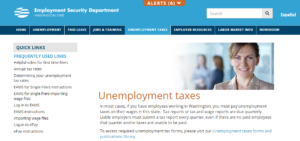Governor Signs COVID Relief Bill
February 10, 2021

The Governor signed a new unemployment “relief” bill into law, effective immediately. As part of the Governor’s overall COVID-19 recovery package, Senate Bill 5061:
- Increases minimum unemployment benefits for workers to 20% of their weekly average; and
- Provides for the smoothing of the impending additional unemployment insurance taxes for businesses over the next four years.
According to the Governor’s post about the measure, SB 5061 relieves employers of individual benefit charges for claims that occurred between March 22 and May 30, 2020. This is the time period of the governor’s first “Stay Home, Stay Healthy” order that mandated the shutdown of many businesses. It also caps certain tax rates through 2025. Together, these actions prevent $1.7 billion of the anticipated spike in unemployment taxes over the next five years, including just over $920 million in rate increases this year. However, employers would still be on the hook for what could be over $5 billion in increased unemployment insurance costs caused by the Governor mandating that businesses shut down.
While some business associations testified in favor of the bill, BIAW lobbyist Tom Kwieciak and other business lobbyists testified against the measure in committee on Jan. 13. BIAW wants the state to provide real relief to businesses forced to close and lay employees off. We also want to see some accountability for the negligent actions that allowed over half a billion dollars in fraudulent payouts from the Employment Security Department (ESD).
We are concerned about merely postponing the pain and forcing businesses to ultimately shoulder the burden of the shutdown. As it stands, businesses will still be paying for about 75% of the problem caused by government-mandated shutdowns.
We recognize this bill was a work in progress and an important small step in making businesses whole. BIAW calls upon the Legislature, ESD and the Governor to provide real assistance to ease the pain these shutdowns caused so we can continue contributing to the state’s COVID-19 economic recovery.
